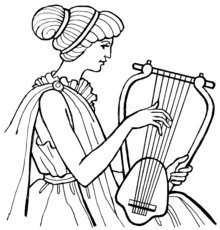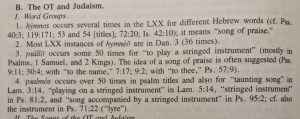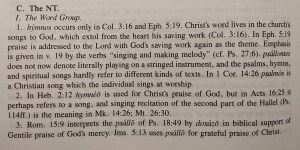PSALLO: WORD MEANINGS CHANGE. It’s called ‘etymology’, the study of how word meanings change over time. “Bad” is good, “gay” means homosexual, and “psallo” became to mean sing. Stick with me on this.
Think of the word “lyric”. Lyrics are the words of a song. Do you know what the word derived from? Etymologically, it evolved from the stringed instrument called the Lyre”. And now lyric has nothing to do with plucking a stringed instrument.
Kittle’s Theological Dictionary of the New Testament studies Greek words. Typically, there will be given four different periods of Greek usage. The first meaning will the meaning in ancient “Classical” Greek as in the time of Alexander, Plato, Aristotle. The second meaning in Kittle’s dictionary will give the meaning in the Greek Old Testament (see Image 1 below), called the Septuagint (often identified only as LXX). The same word will have a new definition because it has changed etymologically. The third Kittle definition (see image 2 below) will be the New Testament “Koine” Greek meaning. And the fourth section of Kittle defintion will give extra-biblical usage outside of the New Testament.
Here’s the point. The Kittle dictionary, as well as other reliable sources, show that Greek word gives the meaning of Psallo in OT usage (LXX) “to play a stringed instrument”. Kittle then gives the New Testament definition for the word: ” singing and making melody” and Kittle adds this delicious bit of information on the word that “psallontes does not denote literally playing on a stringed instrument”. By the New Testament period, etymologically, no musical instrument is denoted in the word when used in Ephesians 5:19 and Colossians 3:16. Kittles isn’t the only authority that points this out.
The psalm become vocal music only. The first century Christian who read Paul’s words to sing Psalms got only the picture of singing and to metaphorically make music in the heart.
[Image 1]
[Image 2]
Categories: Uncategorized




You'll recall that Timothy was in Ephesus (1 Tim 1:3), at least for some time, and may have been one of the readers of what Paul wrote to the Ephesians in Eph 5:19.
You'll also recall that Timothy had known the Old Testament scriptures (since those were the only scriptures available at the time) since childhood (2 Tim 3:15).
So the possibilities are:
1) Timothy understood “psallo” to mean one thing in “the Scriptures” (the Old Testament) and a different thing in Paul's writing,
OR
2) Paul understood “psallo” in both “the Scriptures” (the OT) and in Paul's writing to mean “vocal music only”,
OR
3) Timothy understood “psallo” in both “the Scriptures” (the OT) and in Paul's writing to mean “a song accompanied by a musical instrument”.
I believe we could agree that possibility #2 can be eliminated, as it is clear that “psallo” in the Old Testament does not mean “vocal music only”, as you have stated that “the meaning of Psallo in OT usage (LXX)[is] 'to play a stringed instrument'”.
If possibility #3 is correct, then we also, as did Timothy, should understand “psallo” in the New Testament to mean “a song accompanied by a musical instrument”.
If that conclusion is distasteful, all that is left is possibility #1, that Timothy understood the word “psallo” to mean something different in his understanding of Scriptures from childhood as opposed to his understanding of what Paul was saying, and we also must figure out this difference in meaning. However, if we must figure out this difference in meaning, we have to do so from some source outside of the Scriptures, meaning that the Scriptures are *not* sufficient for providing all we need to understand what we need to understand.
So those three options, rephrased, are:
1) the Bible alone is not sufficient to teach us what we need to know,
OR
2) “psallo” means the same thing in both the Old and New Testaments, to be “vocal music only” (which we've agreed is not the case),
OR
3) “psallo” means the same thing in both the Old and New Testaments, to be “a song accompanied by a musical instrument”.
You'll forgive me for using Biblical terms the way God has used them rather than the way non-Biblical authorities use them?
LikeLike
Here's a perfect example of the false dilemma of only three options.
Option 4: Timothy was raised on the Old Testament Scriptures and understood psallo to refer to plucking a stringed instrument and Timothy understood Paul's usage of the word to refer to sing as Timothy understood what most people do that word meaning change over time. E.g. A musical instrument called a Lyre is now the word “lyric” which is words to be sung.
LikeLike